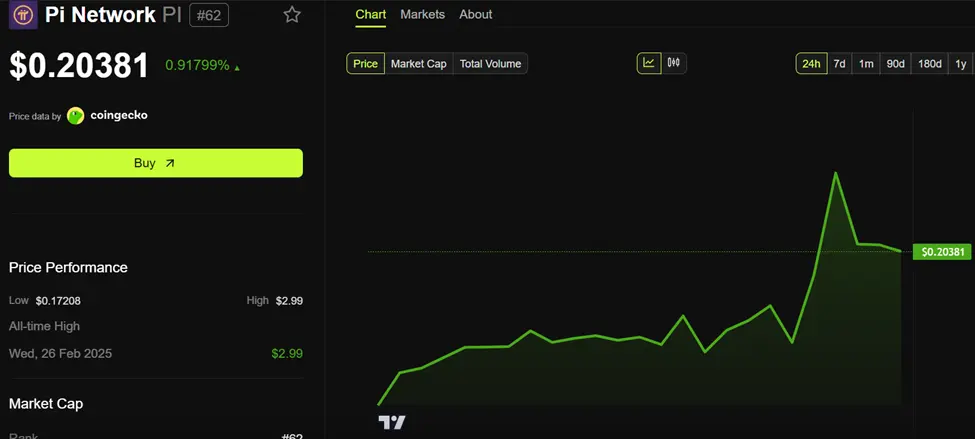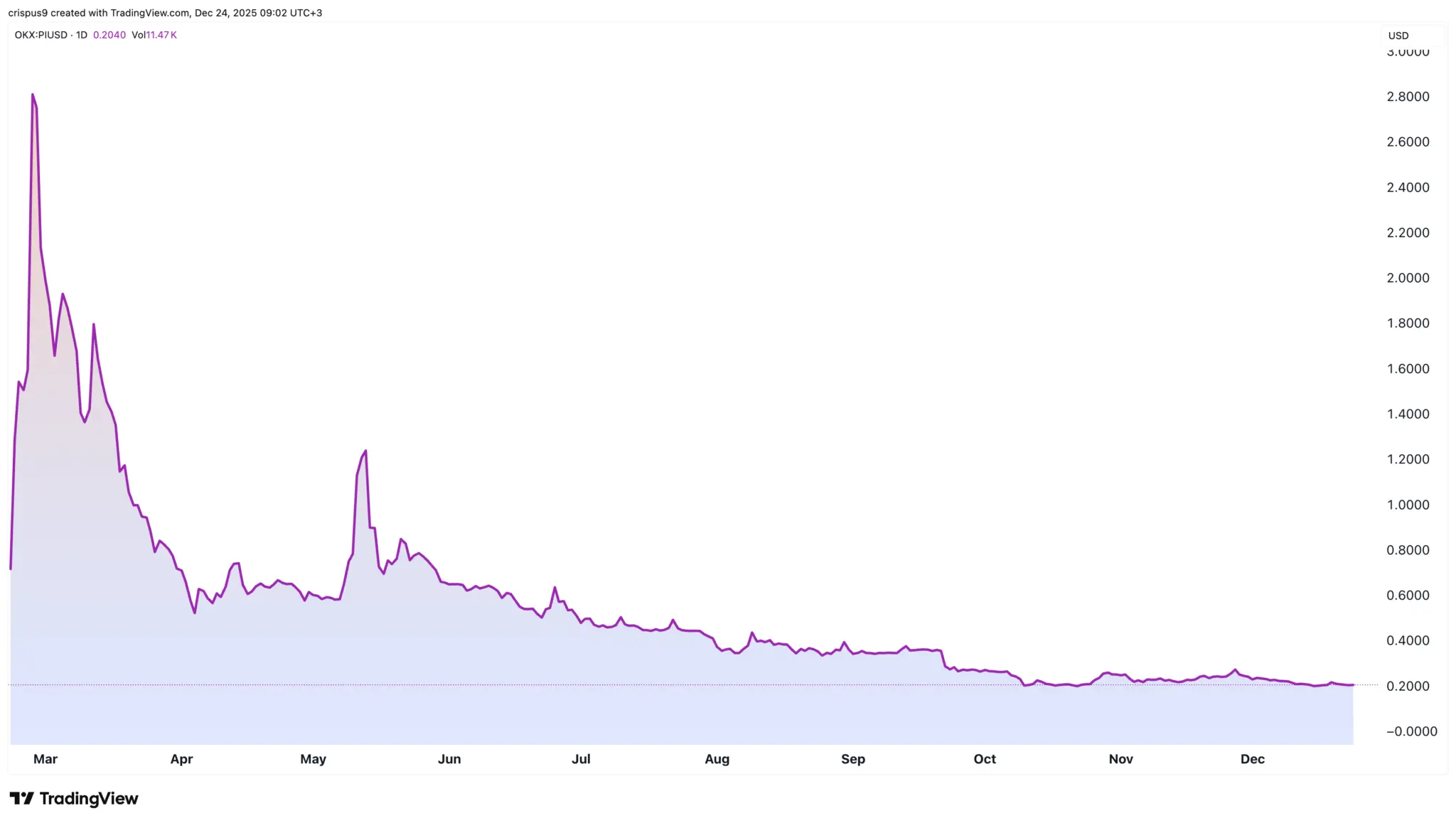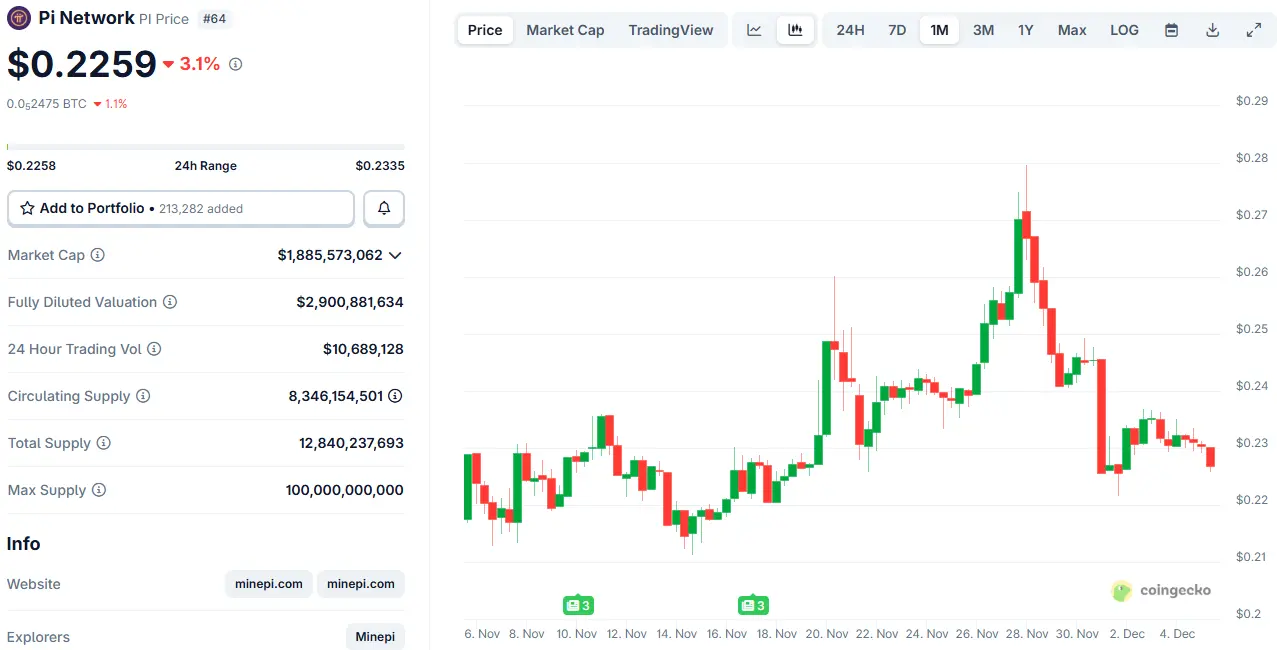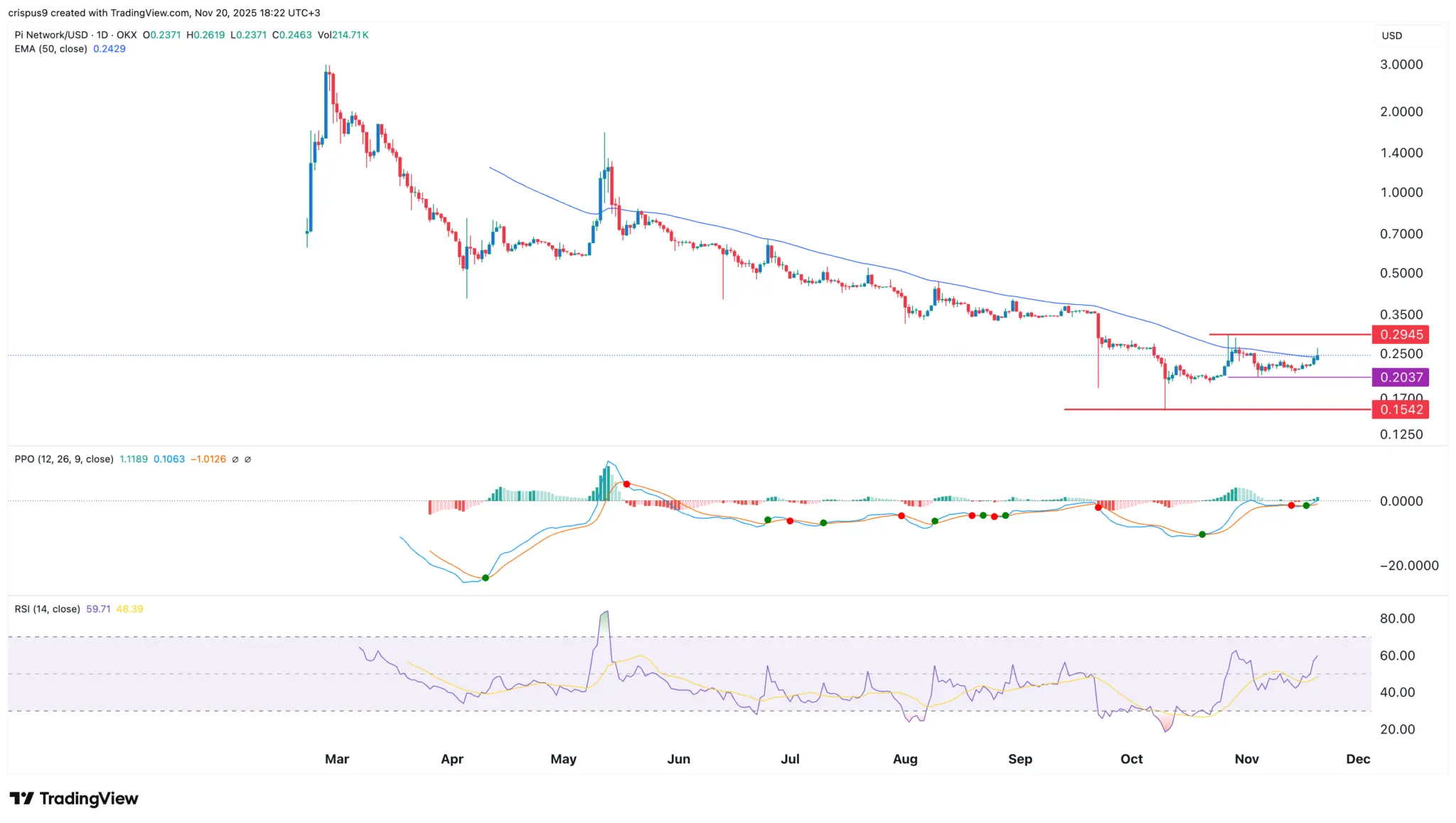Pi Network





 -0.05%
-0.05%

Anwarws4
2023-09-15 15:44
less favored by investors

Exposure

unslepyknight
2023-08-29 15:48
scam so hurtful

Exposure

kheldarren
2022-10-18 11:34
this platform is started several years ago but the withdrawal is not yet ipen for the user this is a useless app that everyone is disaapointed.

Exposure

ᝰ静এ
2022-01-05 03:22
They have been completely brainwashed. They have dreamed of one coin for model and one coin for $1000. They are completely crazy. I try to talk to them, but receive endless abuse!

Exposure
Abdulwahid Muhammad44560
2021-11-28 10:18
pi network is scan I use pi network coin test transfer to some one not get the coin in I send 50pi but in their Blockchain show that is 100 I send tha av to now the Parsons did reseave the coin

Exposure

FX1054755365
2021-11-23 17:47
I am not sure of the value but I have heard that it doesn't have one but will soon get a value so we r unable to withdraw.

Exposure
| Aspect | Pi Network |
| Founded Year | 2019 |
| Main Founders | Nicolas Kokkalis |
| Support Exchanges | Huobi Global, Binance,BitMart,Gate.io,YoBit |
| Storage Wallet | Pi Network App,Pi Wallet, Hardware Wallet,Desktop Wallet, Web Wallet, Exchange Wallet |
Overview of Pi Network
Pi Network is a cryptocurrency project that was first launched in March 2019. It is developed and maintained by three Stanford graduates: Dr. Nicolas Kokkalis, Dr. Chengdiao Fan, and Vincent McPhillip. The unique aspect of the Pi Network is that it allows users to mine Pi cryptocurrency directly from their smartphones, with the intention of minimizing the electricity and computational power typically associated with cryptocurrency mining. It aims to remove the barriers to entry that many potential cryptocurrency enthusiasts face due to the cost of mining equipment and the knowledge required to mine. Pi Network also created its native mobile application available on iOS and Android devices enabling users to earn cryptocurrency for validating transactions on the blockchain.
Pros and Cons
| Pros | Cons |
| Allows mining from smartphones | Not yet tradeable on major cryptocurrency exchanges |
| Low barrier to entry | Limited technological infrastructure |
| Developed by Stanford graduates | Lacks wider recognition in the crypto community |
| Environmentally friendly due to low power consumption | Unit value and market applications still uncertain |
Security
Pi Network uses the Stellar Consensus Protocol (SCP), a security protocol that ensures the safety of transactions and data within the network while sustaining a decentralized system. The SCP helps protect the network from “Sybil attacks,” where a user creates multiple accounts to take over the network. Additionally, Pi Networks mobile app, where mining occurs, needs no unnecessary data permission, ensuring user data safety. Each user on the network is asked to verify their personhood by adding security circles that include other trustworthy users in the network. This enhances the network's security by determining a common trust graph.
Pi network price prediction
According to relevant predictions, starting from 2027, the price of Pi network will show a continuous upward trend. In 2027, the lowest price is expected to be 172.98, and the highest price is 193.97, the average price is 226.84. The predicted price range in 2029 is the same as that in 2028. In 2030, the lowest price is expected to be 271.78, and the highest price is 340.17, the average price is 374.60. In 2032, the lowest price is 510.52, and the highest price is 692.96, the average price is 725.72. In 2034, the lowest price is 968.61, and the highest price is $981.86. Overall, the price of Pi network is predicted to rise steadily in the coming years.
How Does Pi Network Work?
Pi Network operates by enabling users to mine Pi cryptocurrency directly from their smartphones without draining the battery life or utilizing significant computational power. This is done through the use of the Stellar Consensus Protocol (SCP) which secures transactions and data on the platform whilst also maintaining decentralization.
To clarify, Pi Network does not exactly “mine” cryptocurrency like Bitcoin does. Instead, it uses a Proof-of-Consensus algorithm where users vouch for each other as trustworthy. Through a system of committees and security circles wherein each user designates several others they trust, the network achieves a series of interlocking “security circles” that help to ensure the fidelity of transactions on the network.
Once you are connected to the network via the Pi Network application on your smartphone, you must regularly (at least once per day) validate your presence and provide the proof of trust links to other users you know and trust. In return for this, you receive Pi coins.
Exchanges to Buy Pi
Here are some DEXs that support trading of Pi Network (PI):
BitMart:
BitMart is a popular cryptocurrency exchange that supports a wide variety of cryptocurrencies, including Pi Network (PI). It offers a user-friendly platform and a variety of trading features, including margin trading and staking services. BitMart is currently the most popular exchange for trading Pi Network, with the highest trading volume and liquidity.
HTX (Huobi Global):
HTX (Huobi Global) is another popular cryptocurrency exchange that supports a wide variety of cryptocurrencies, including Pi Network (PI). It offers a user-friendly platform and a variety of trading features, including margin trading and futures trading. HTX is another option for trading Pi Network, though it has less trading volume and liquidity than BitMart.
Gate.io:
Gate.io is a global cryptocurrency exchange that supports a wide variety of cryptocurrencies, including Pi Network (PI). It offers a user-friendly platform and a variety of trading features, including margin trading and leveraged tokens. Gate.io is a less popular option for trading Pi Network, but it still has some liquidity for the asset.
How to Store Pi?
There are several ways to store Pi, each with its own level of security and convenience. Here are a few of the most popular options:
Pi Network Mobile App: The Pi Network mobile app is the simplest and most convenient way to store your Pi. However, it is not the most secure option, as your Pi is stored on the Pi Network's servers.
Pi Wallet: The Pi Wallet is a software wallet that you can install on your computer or mobile device. It is more secure than the Pi Network mobile app, as your Pi is stored on your own device.
Hardware Wallet: A hardware wallet is the most secure way to store your Pi. It is a physical device that you can plug into your computer or mobile device. Your Pi is stored on the hardware wallet itself, and it is not connected to the internet.
What Makes Pi Network Unique?
Pi Network has several unique features that distinguish it from other cryptocurrency projects:
1. Mobile Mining: Pi Network's protocol allows users to mine the cryptocurrency directly from their smartphones without excessive battery drain, making it more accessible to those without technical know-how or expensive hardware.
2. User-oriented Security Circles: Users strengthen the system's security by forming a security circle of trusted connections. This circle aids in validating transactions and establishing trust within the network.
3. Stellar Consensus Protocol (SCP): Pi Network uses the Stellar Consensus Protocol to secure the network. This tactic assists in protecting the Pi Network from potential attacks and maintaining a decentralized system.
Can You Make Money?
Currently, Pi Network's cryptocurrency is not yet tradable on any exchanges, meaning it has no established market value. However, the team does have plans for it to be exchangeable in the future. If Pi becomes a successful digital currency after it moves to Phase 3 (Mainnet), then those who have mined Pi coins on their smartphones could potentially benefit.


Website
Most visited countries/areas
Ecuador
Dominica
Indonesia

minepi.com
Server Location
Ireland
Most visited countries/areas
Canada
Domain
minepi.com
ICP registration
--
Website
WHOIS.SQUARESPACE.DOMAINS
Company
SQUARESPACE DOMAINS II LLC
Domain Effective Date
2018-12-04
Server IP
185.45.7.165

pinet.com
Server Location
United States
Most visited countries/areas
--
Domain
pinet.com
ICP registration
--
Website
WHOIS.GODADDY.COM
Company
GODADDY.COM, LLC
Domain Effective Date
2003-06-13
Server IP
34.36.183.20



Content you want to comment
Please enter...
Comment 125
News

Pi Network Halts Payment Requests After Scam Drains 4.4 Million Pi Coins
Members of the Pi Network community are raising alarms over a growing scam method that has already r
2025-12-31 15:02

The rise and the tragic fall of Pi Network
Pi Network, a crypto project that was meant to disrupt the industry, has become one of the biggest f
2025-12-24 17:00

Will PI Rebound In The Week Ahead? ChatGPT With Pi Network Price Predictions
Pi Networks native token has proven in recent months to defy the overall market trend. For example,
2025-12-06 14:02

Top crypto to watch this week: Monad, Pi Network, XRP
The crypto market remained under pressure last week as Bitcoin and top tokens retreated, erasing bil
2025-11-24 15:00

Pi Network outpaces Coinbase and OKX with 100M downloads
Pi Network has surpassed 100 million downloads on Google Play, outpacing major crypto exchanges including Coinbase, OKX, and Crypto.com.
2025-11-05 20:00

Pi Network (PI) News Today: October 18th
PI‘s price continues to sink, but the project behind the token remains in the spotlight with a serie
2025-10-18 13:03



硅谷交易员31
2024-05-25 15:40
This is a scam platform. It's been many years. It has always been active in some areas.
Exposure